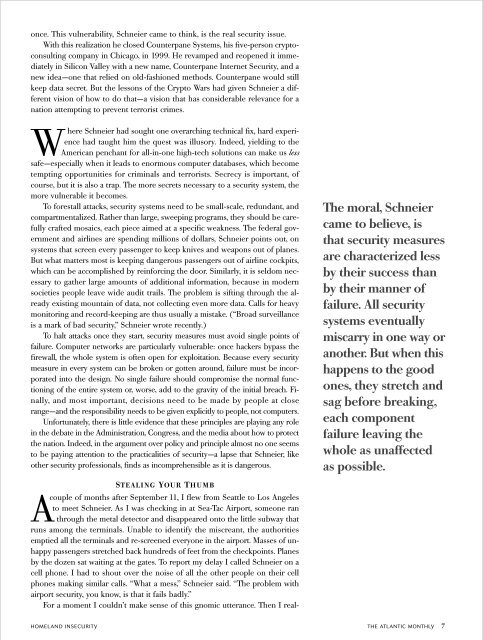HOMELAND INSECURITY - Charles C. Mann
HOMELAND INSECURITY - Charles C. Mann
HOMELAND INSECURITY - Charles C. Mann
You also want an ePaper? Increase the reach of your titles
YUMPU automatically turns print PDFs into web optimized ePapers that Google loves.
Sept-Insecurity.pages 6/28/02 10:37 AM Page 7<br />
once. This vulnerability, Schneier came to think, is the real security issue.<br />
With this realization he closed Counterpane Systems, his five-person cryptoconsulting<br />
company in Chicago, in 1999. He revamped and reopened it immediately<br />
in Silicon Valley with a new name, Counterpane Internet Security, and a<br />
new idea—one that relied on old-fashioned methods. Counterpane would still<br />
keep data secret. But the lessons of the Crypto Wars had given Schneier a different<br />
vision of how to do that—a vision that has considerable relevance for a<br />
nation attempting to prevent terrorist crimes.<br />
Where Schneier had sought one overarching technical fix, hard experience<br />
had taught him the quest was illusory. Indeed, yielding to the<br />
American penchant for all-in-one high-tech solutions can make us less<br />
safe—especially when it leads to enormous computer databases, which become<br />
tempting opportunities for criminals and terrorists. Secrecy is important, of<br />
course, but it is also a trap. The more secrets necessary to a security system, the<br />
more vulnerable it becomes.<br />
To forestall attacks, security systems need to be small-scale, redundant, and<br />
compartmentalized. Rather than large, sweeping programs, they should be carefully<br />
crafted mosaics, each piece aimed at a specific weakness. The federal government<br />
and airlines are spending millions of dollars, Schneier points out, on<br />
systems that screen every passenger to keep knives and weapons out of planes.<br />
But what matters most is keeping dangerous passengers out of airline cockpits,<br />
which can be accomplished by reinforcing the door. Similarly, it is seldom necessary<br />
to gather large amounts of additional information, because in modern<br />
societies people leave wide audit trails. The problem is sifting through the already<br />
existing mountain of data, not collecting even more data. Calls for heavy<br />
monitoring and record-keeping are thus usually a mistake. (“Broad surveillance<br />
is a mark of bad security,” Schneier wrote recently.)<br />
To halt attacks once they start, security measures must avoid single points of<br />
failure. Computer networks are particularly vulnerable: once hackers bypass the<br />
firewall, the whole system is often open for exploitation. Because every security<br />
measure in every system can be broken or gotten around, failure must be incorporated<br />
into the design. No single failure should compromise the normal functioning<br />
of the entire system or, worse, add to the gravity of the initial breach. Finally,<br />
and most important, decisions need to be made by people at close<br />
range—and the responsibility needs to be given explicitly to people, not computers.<br />
Unfortunately, there is little evidence that these principles are playing any role<br />
in the debate in the Administration, Congress, and the media about how to protect<br />
the nation. Indeed, in the argument over policy and principle almost no one seems<br />
to be paying attention to the practicalities of security—a lapse that Schneier, like<br />
other security professionals, finds as incomprehensible as it is dangerous.<br />
STEALING YOUR THUMB<br />
Acouple of months after September 11, I flew from Seattle to Los Angeles<br />
to meet Schneier. As I was checking in at Sea-Tac Airport, someone ran<br />
through the metal detector and disappeared onto the little subway that<br />
runs among the terminals. Unable to identify the miscreant, the authorities<br />
emptied all the terminals and re-screened everyone in the airport. Masses of unhappy<br />
passengers stretched back hundreds of feet from the checkpoints. Planes<br />
by the dozen sat waiting at the gates. To report my delay I called Schneier on a<br />
cell phone. I had to shout over the noise of all the other people on their cell<br />
phones making similar calls. “What a mess,” Schneier said. “The problem with<br />
airport security, you know, is that it fails badly.”<br />
For a moment I couldn’t make sense of this gnomic utterance. Then I real-<br />
The moral, Schneier<br />
came to believe, is<br />
that security measures<br />
are characterized less<br />
by their success than<br />
by their manner of<br />
failure. All security<br />
systems eventually<br />
miscarry in one way or<br />
another. But when this<br />
happens to the good<br />
ones, they stretch and<br />
sag before breaking,<br />
each component<br />
failure leaving the<br />
whole as unaffected<br />
as possible.<br />
<strong>HOMELAND</strong> <strong>INSECURITY</strong> THE ATLANTIC MONTHLY 7




